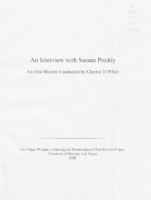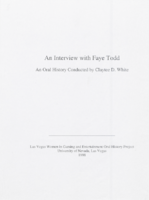Search the Special Collections and Archives Portal
Search Results
Audio recording clip of interview with Faye Duncan Daniel by Claytee D. White, October 18, 1996
Date
Archival Collection
Description
Part of an interview with Faye Duncan Daniel by Claytee White on October 18, 1996. Daniel discusses the Displaced Homemaker Program and Help Centers of Southern Nevada, which resulted in Women of Achievement.
Sound
Audio recording clip of interview with Anna Bailey by Claytee D. White, March 3, 1997
Date
Archival Collection
Description
Part of an interview with Anna Bailey by Claytee White on March 3, 1997. Bailey describes her arrival in Las Vegas and opening night at the Moulin Rouge.
Sound
Audio recording clips of interview with Hazel Gay by Claytee D. White, December 2, 1995
Date
Archival Collection
Description
Three audio clips from an interview with Hazel Gay conducted by Claytee D. White on December 2, 1995. Hazel and her husband Jimmy Gay moved to Las Vegas in 1946, becoming leaders in the African American community during the civil rights era. In the clips, Gay recalls the Moulin Rouge from her perspective as manager of the dress shop.
Sound
Audio recording clip of interview with Jerry Eppenger by Claytee D. White, September 14, 2011
Date
Archival Collection
Description
Part of an interview with Jerry Eppenger by Claytee D. White on September 14, 2011. Eppenger describes his arrest for a curfew violation while leaving work following a riot on the Westside in 1969.
Sound
Audio recording clip of interview with Rachel Coleman by Claytee D. White, July 24, 1996
Date
Archival Collection
Description
Part of an interview with Rachel Coleman conducted by Claytee D. White on July 24, 1996. In the clip, Coleman describes her work as a business agent addressing workplace grievances and relates her experience with a fist fight that went into arbitration.
Sound
Audio recording clip of interview with Mary Louise Williams by Claytee D. White, June 19, 1998
Date
Archival Collection
Description
Part of an interview with Mary Louise Williams conducted by Claytee D. White on June 19, 1998. Williams recalls working as a showgirl at the Moulin Rouge and traces her subsequent careers as a social worker and school teacher.
Sound
Audio recording clip from interview with Sonny Thomas by Barbara Tabach, February 28, 2013
Date
Archival Collection
Description
Part of an inverview with Sonny Thomas conducted by Barbara Tabach, February 28, 2013. Thomas describes job options when he arrived in Las Vegas in 1959.
Sound
Audio clips from interview with Blaine Benedict, November 12, 2015
Date
Archival Collection
Description
In these clips, Blaine Benedict dicusses how his family came to live in Las Vegas, Nevada; his father's career in Las Vegas casinos; and working in the casinos as a youth.
Sound

Transcript of interview with Sarann Knight Preddy by Claytee D. White, June 5, 1997
Date
Archival Collection
Description
Interview with Sarann Knight Preddy conducted by Claytee D. White on June 5, 1997. Preddy moved to Hawthorne, Nevada, in the 1940s, becoming a business owner and president of the NAACP. Later she moved to Las Vegas, where she served as a community activist and worked as one of the first black 21-dealers.
Text

Transcript of interview with Faye Todd by Claytee D. White, October 15, 1996
Date
Archival Collection
Description
Interview with Faye Todd conducted by Claytee D. White on October 15, 1996. Featured in Ebony Magazine in 1979, Todd achieved executive status in the Las Vegas gaming industry, serving as Special Events Coordinator for Desert Inn Hotel and Casino and Entertainment Director/Corporate Executive Assistant for Landmark Hotel and Casino.
Text
